#2023 WGA Strike
Text
Genuinely I think that an entertainment industry strike is one of the best things that can happen in the late capitalist hellscape of our current era.
Because if people already don't have bread, and you take away their circuses, well...
It tends to not go well for empires, when that happens.
#the great entertainment strike of 2023#labor rights#sag aftra#2023 wga strike#2023 sag aftra strike
991 notes
·
View notes
Text
Alissa Wilkinson at Vox:
The Hollywood writers strike marked its one-month anniversary on Friday, with no signs of slowing down. While other guilds in the industry are still on the job — except when they’re blocked by picket lines — the writers may soon get company on those picket lines.
Two other major entertainment guilds, the Directors Guild of America (DGA) and Screen Actors Guild (SAG-AFTRA), also entered the summer with looming contract expiration dates. Both groups’ agreements with AMPTP, the trade association that represents the industry’s film and TV production companies, end on June 30. A lot could happen between now and then, but the situation is looking dicey.
All of that means that come July 1, the studios may be facing a double or even triple strike, in effect shutting Hollywood down completely.
The DGA rarely strikes — the last time was in 1987 — and its leadership has not called for a strike authorization vote. But its relations with the AMPTP have been trickier than usual. Negotiations began on May 10, with demands that in part mirror the WGA’s concerns. The main sticking point is wage and residual increases that keep in step with rising costs of living. In particular, lower residuals for shows on streaming services, where the lion’s share of entertainment now lives, have wreaked havoc for many people in the industry, drastically reducing compensation and making it increasingly difficult to just pay the bills.
In the past, the DGA has sometimes managed to make an agreement with AMPTP ahead of the start of bargaining, effectively setting a pattern for the WGA and SAG-AFTRA to follow in their own demands. Last November, the DGA sent a “pre-negotiation” offer to the AMPTP, seeking resolution ahead of bargaining. The AMPTP reportedly rejected the DGA’s proposal, meaning both parties came to the bargaining table without an arrangement.
The situation seemed to intensify due to an unforced error. On May 23, Warner Bros. Discovery launched Max, its newly rebranded streaming platform, which had previously been named HBO Max. Eagle-eyed observers noticed that in listed credits, the platform lumped writers, directors, producers, and so on into one category labeled “creators.” Aside from the queasy implications that the greatest works of cinema and television were just “content,” the choice on the company’s part ran afoul of hard-fought contract regulations regarding credits for artists.
It was a weird choice, and one that set blood boiling in Hollywood. The presidents of the WGA and the DGA issued a rare joint statement, with DGA president Lesli Linka Glatter noting that “The devaluation of the individual contributions of artists is a disturbing trend and the DGA will not stand for it. We intend on taking the strongest possible actions, in solidarity with the WGA, to ensure every artist receives the individual credit they deserve.”
By the end of the day, Warner Bros. Discovery announced that it would modify how credits were listed on the platform in compliance with its preexisting contract agreement with the unions. Yet the strong language indicated that the DGA was ready to play hardball.
Meanwhile, members of SAG-AFTRA have been vocally supportive of the WGA. This is no shock, since on top of the same issue of residuals and wages, the union — which includes, in addition to film and TV actors, people who work in radio, singers, voice actors, influencers, models, and other media professionals — is concerned about the existential threat posed by AI and other technologies. Even before the WGA’s strike began, SAG-AFTRA issued statements regarding how the use of AI could eliminate or greatly reduce work for its members.
Members of SAG-AFTRA have shown up on picket lines to support the writers, and the star power posed by some of its most prominent members helps bring attention to the WGA’s strike. It’s also an effort to remind the studios that when their own negotiations begin, they’re ready for a fight. Underlining that implicit statement, the leadership of SAG-AFTRA unanimously agreed to ask its membership for a strike authorization vote, which concludes this coming Monday, June 5. That’s a move designed to signal solidarity to the AMPTP ahead of negotiations.
[...]
Here’s what’s most significant about all of this: All three unions have never gone on strike at the same time, in the history of Hollywood. The fact that this scenario is possible, even likely, emphasizes how extraordinary this moment is in the entertainment business.
Hollywood could be on the verge of a triple strike that could effectively shut down everything completely. The WGA strike is ongoing, but the SAG-AFTRA and/or the Directors Guild could also launch their own strikes.
#WGA Strike#WGA#2023 WGA Strike#SAG AFTRA#Directors Guild of America#Strikes#Labor#2023 SAG AFTRA Strike#Max#HBO Max#Streaming#Television
67 notes
·
View notes
Text
If tv, movie studios, and book publishers start putting out AI generated stuff, I feel someone with the know how should make a website where we can look up a piece of media to determine how much AI was used so we don't waste our time.
#2023 wga strike#wga strike#wga solidarity#wga strong#srsly we need to make ai generated crap a full on failure#i dont care if its convincing it needs to be disclosed if its ai generated or not and then deliberately ignored
20 notes
·
View notes
Text
Tentative movement on a deal for the WGA
8 notes
·
View notes
Text
The. Deal. Is. So. Good.
Couldn't get the link to the side-by-side of the WGA offer, the AMPTP counter offer from May, and the final deal, because it's a document to download and too many pictures to take for this post that probably wouldn't be legible, but it's in this tweet (click the link below the tweet to go to said tweet):
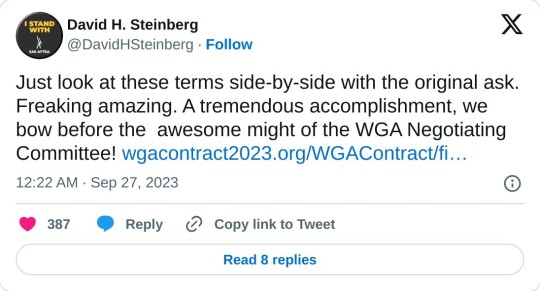
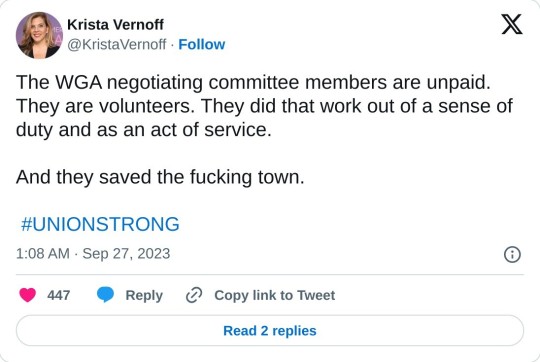
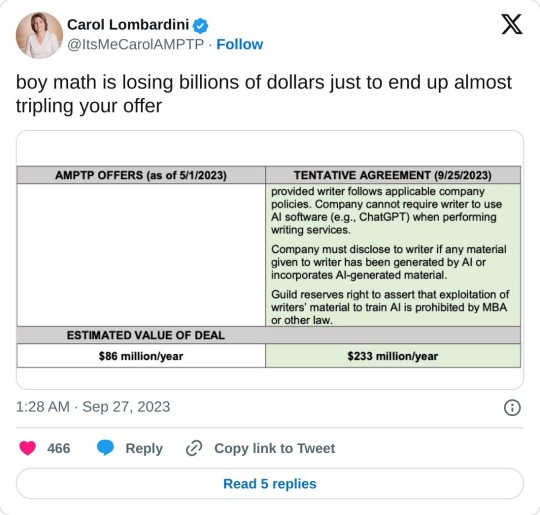
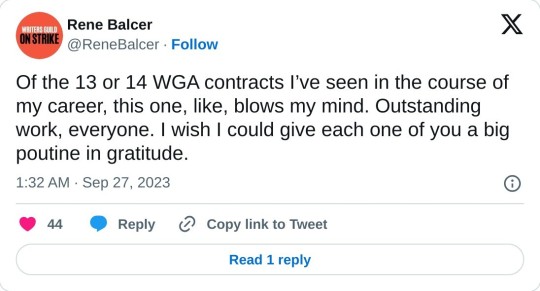
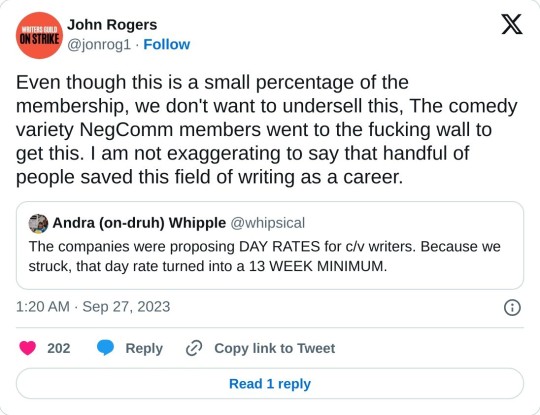
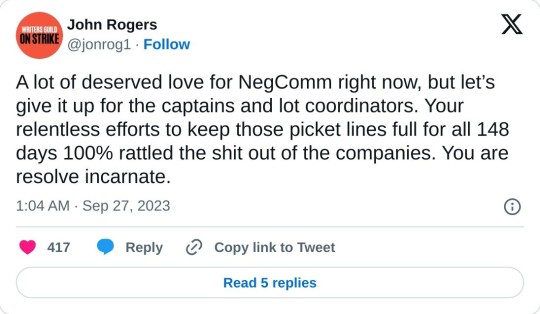

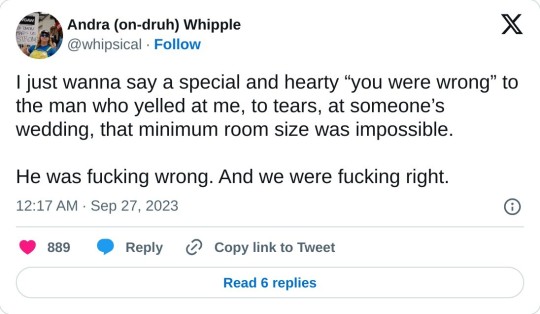
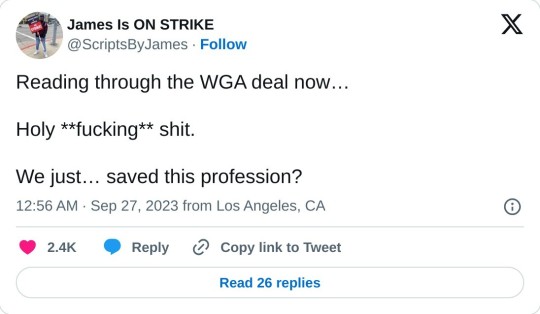
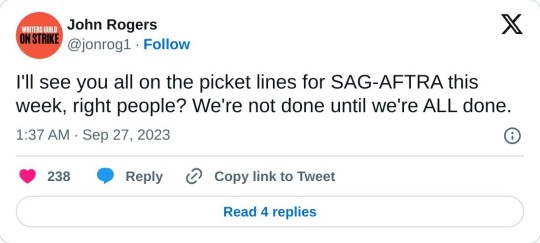
Don't forget,the fight isn't over for SAG-AFTRA and next year, contracts are up again for IATSE, including The Animation Guild.
If you're a fan of movies, tv, and animation, keep helping the guilds fight the good fight!
Also, please support the other unions that are out their now fighting their own fights including Amazon workers, Local 11 in LA, and Flight Attendants!
And of course, big thanks to strike hero Drew Carey for paying for probably THOUSANDS of meals for striking writers in LA these past five months.
Congratulations WGA and Pre-WGA for your amazing wins with this contract!
#wga strong#wga strike#wga strike wins 2023#wga strike 2023#1u#solidarity summer#hot strike summer#summer of solidarity#sag aftra#sag aftra strike#sag aftra strong
41K notes
·
View notes
Text
The picketing has begun. After weeks of negotiations, Hollywood screenwriters have decided to strike. According to the Writers Guild of America, the union representing film and television writers, members are gathering in front of the offices of major studios in Los Angeles and New York starting this afternoon.
This isn’t the first time the minds behind popular films and TV shows have stepped away from their keyboards after failing to reach a deal with the Alliance of Motion Picture and Television Producers, which represents production companies’ interests. The WGA has gone on strike several times before, most recently in 2007 for a shutdown that lasted 100 days. But in the 15 years since that strike ended, monumental changes have occurred within the industry. The “streaming wars” began. Peak TV emerged. Movie-theater attendance declined, and film studios prioritized franchises. Meanwhile, the coronavirus pandemic disrupted, well, pretty much everything about production. As my colleague Xochitl Gonzalez, a member of the WGA, wrote last week, these shifts have led to “an existential crisis in the profession.”
This crisis has consequences beyond Hollywood itself. Strikes examine the potential consequences of major technological shifts—think the rise of artificial intelligence, and the possibility of chatbots learning to draft screenplays—and the writers’ strike in particular can inform how other industries approach labor disputes. That’s what Kate Fortmueller, an assistant professor of entertainment and media studies at the University of Georgia, told me when I called her last week. She and I last spoke in 2021, when the union representing the behind-the-scenes workers on Hollywood productions voted to authorize a strike.
Fortmueller sees the WGA’s call raising similar questions around how employees in general should be treated. “As audience members, we could be more reflective,” she said. “What are the conditions under which [a film or TV show] is being made? Who’s being rewarded for this work? Who should be rewarded for this work?” As the strike continues, below are four ways to think about these questions from the other side of the screen.
This strike isn’t just about pay; it’s also about creative potential.
If you subscribe to any of the seemingly countless streaming services available today, you’ve probably felt overwhelmed by the sheer amount of content. More TV, though, hasn’t always meant better opportunities for writers—or better TV, for that matter. According to the WGA, although there’s been a boom in demand for scripts, the median weekly pay for TV writer-producers, adjusted for inflation, declined by 23 percent over the past decade. Julian Hoxter, a professor of cinema at San Francisco State University and co-author of Off the Page: Screenwriting in the Era of Media Convergence, told me that inconsistency among productions and cost-cutting moves have led to writers being treated as expendable resources. Streaming shows can range in season length but typically run for fewer episodes than network shows, leading to less pay for writers per series. Plus, such programming—usually released for binging—tends to make use of “mini rooms,” gathering a handful of writers to crank out scripts before filming begins instead of establishing a writers’ room that meets regularly, often preventing younger writers from developing the experience they need to grow. Streaming residuals, meanwhile, have not proved to be a steady source of income.
And that’s just on the TV side. Many movie writers also feel that they’re not being paid fairly, according to Hoxter. He told me that as film studios have become more risk-averse and sought more IP-based, franchise-friendly material, they’ve come to frequently pursue “one-step deals.” This tactic involves paying a screenwriter for only their first draft of a script and then deciding afterward whether to retain them for future drafts. The result, he explained, “places pressure on the writer to deliver what she thinks the studio wants the first time around,” which “fundamentally disincentivizes creative risk-taking.” To stay competitive, studios and streamers need more content, but the more they produce, the more strain they put on writers. And the more strain they put on writers, the less writers can develop and polish material. Think of this process as a domino effect, with the writers as the pieces that fall first and the viewers as the last ones in line, likely not noticing shifts in quality until years down the line.
“When you are stressed about your ability to make a living, it’s very hard to be creative and operate at the top of your game,” Eric Haywood, a writer for Law & Order: Organized Crime and a member of WGA’s negotiating committee, told me. “A lot of people have been placed in this position where they pretty much have to do whatever it takes to land the job and then to keep the job. That makes it a lot harder to push back and exert your creative authority.”
How you watch films and TV shows matters more than you may think.
The WGA has consistently gone on strike when “new developments in distribution and exhibition technologies” have emerged, Hoxter explained. The 1988 strike involved negotiations over residuals from syndication and home video. In 2007–08, discussions about the internet’s role in distribution dominated much of the discussions. This year’s strike is over similar issues, focusing on streaming platforms and their continued impact on writers’ assignments and livelihoods.
But because platforms vary wildly in content, popularity, and ad revenue, figuring out how viewers will engage with what Hollywood releases is a guessing game, Fortmueller said: “Everyone’s trying to predict the future and do research as far as costs and potential profits. You do your best, but no one really knows.”
Still, Haywood pointed out, the WGA tries its best to anticipate the debates to come, such as the way the internet would operate as a distributor. “If we hadn’t done [that] in 2007 and 2008, and streaming had become what it is today, it would have just been a disaster,” he said. “It would have wiped out an entire middle class of screenwriters.” How are people watching what they’re watching, and how might that inform their viewing habits years down the line? Will people be willing to watch, let alone become fans of, AI-generated screenplays? Could cable make a comeback after years of cord-cutting? Such questions have to be discussed in advance, Haywood said: “We look down the road and say, ‘Well, what are the things that may not be pressing right this minute?’”
Don’t expect TV to change as much during this strike as it did in the 2000s.
Back in 2007, the timing of the strike coincided with TV’s mid-season schedule, which led to network shows cutting seasons short and relying on unscripted programming to fill their lineups. Today, the streaming model is better prepared for a shutdown. Platforms have libraries of content for audiences to watch, and shows come back when the streamers are ready for them to come back.
That said, if you watch late-night shows and series such as Saturday Night Live—programs for which writers often put together scripts up until the episode airs—you’re going to need to seek other entertainment, as several are shutting down and airing reruns instead. Plus, delays will become more noticeable the longer the strike lasts. “For a week or two, it’s kind of annoying,” Hoxter said. “It’s an inconvenience; it’s a difficult time. But after several months, it can be disastrous”—not just for TV schedules, but for anyone involved in production in Hollywood, forced to wait for work to resume.
What happens in Hollywood matters for any industry reeling from how the pandemic has affected daily life.
Hollywood screenwriting can seem like a glamorous job, but writers are struggling with issues that can resonate beyond the confines of studio backlots. Take the debates over returning to offices after COVID forced people to work remotely: Haywood told me the WGA hopes to keep some of the measures the industry introduced during the pandemic, but to find a way toward “a new normal.” That would include maintaining, he said, “a ladder to success that so many people were able to enjoy for so long, that brought stability to their lives.”
Stability, after all, is the goal. The strike is a last resort; no one wants to have to depend on their savings, to not know when they can get back to work. But after years of uncertainty, writers, no matter how well known, share “this almost universal sense that the ability to make a living is slowly being stripped away,” Haywood said. The record percentage of votes authorizing the strike last month, combined with the support from other unions, demonstrates how crucial the issues that the WGA and the AMPTP are bargaining over have become—perhaps for any industry dealing with intimidating questions over the very nature of their business. “People are beginning to recognize how all of these things are linked, and how workers are being treated in a variety of fields,” Haywood said. “People are ready for workers to get their due.”
#current events#capitalism#employment#writing#film#movies#tv#artificial intelligence#2023 wga strike
0 notes
Text
In the wake of the dual strike I would like to remind everyone that "hollywood elites" is an antisemitic dogwhistle and if you are referring to company executives call them executives
15K notes
·
View notes
Text
Some social issues to read up on if you're looking for something to fight for!
2023 Writers Guild of America Strike - LINK
AEGIS-CWA goes to #UnionizeSega - LINK
1 note
·
View note
Text


and so it begins. May 1st, 2023.
#here we go#writers strike#wga strike#writers guild of america#writers strike 2023#wga strike 2023#art#writing#netflix#amazon#apple tv#disney#nbc#nbc universal#paramount plus#paramount#sony#warner bros#wbd
14K notes
·
View notes
Text

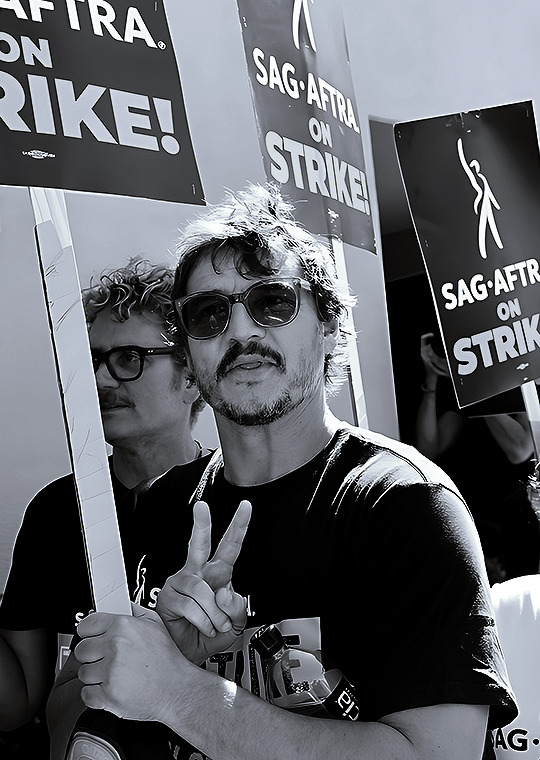
PEDRO PASCAL and members of SAG-AFTRA continue to picket in support of the SAG-AFTRA strike at Warner Bros. Studios on September 26, 2023 in Burbank, California
#pedro pascal#wga strike#sag strike#sag aftra strike 2023#pedropascaledit#ppascaledit#swcastedit#gotcastedit#dccastedit#tloucastedit#flawlessgentlemen#themandaloriandaily#ours#edits#constance
4K notes
·
View notes
Text
look folks, saying that actors are being greedy and don't need to strike because A-list names get paid buckets of money is like saying that food service workers are paid enough and treated perfectly well and don't deserve more compensation because Gordon Ramsay is millionaire
7K notes
·
View notes
Text
Alissa Wilkinson at Vox:
For the first time in 63 years, Hollywood has a double strike on its hands.
The contract between SAG-AFTRA (the Screen Actors Guild and American Federation of Television and Radio Artists, two guilds that merged in 2012) and AMPTP (American Motion Picture and Television Producers), which represents Hollywood’s studios and production companies, expired at midnight on Wednesday, July 12. SAG-AFTRA’s national board unanimously voted today to order a strike; membership had previously authorized the strike, with nearly 98 percent of voters in favor. Meanwhile, the WGA (Writers Guild of America) has been on strike since May 2.
Like the WGA strike, a SAG-AFTRA strike comes with profound economic consequences. The WGA’s picket lines have already managed to shut down most productions in New York and Los Angeles and across the country as crew members refuse to cross. Since SAG-AFTRA represents 160,000 members — “actors, announcers, broadcast journalists, dancers, DJs, news writers, news editors, program hosts, puppeteers, recording artists, singers, stunt performers, voiceover artists, and other media professionals,” as their website puts it — a strike would have profound effects on many industries. (By contrast, the WGA, which has just entered day 73 of its strike, has around 20,000 members.)
To be clear, a strike doesn’t mean people can’t act at all; it means they cannot perform work for struck companies (which is to say, members of the AMPTP, like Disney and Netflix). Unless specific concessions are made, they can’t promote work for struck companies either. (Yes, their publicists are reportedly panicking.)
Major studios, for instance, have been dropping out of Comic-Con rather than have a poor showing with the few actors who might cross the picket line. You likely wouldn’t see actors promoting new movies (like Barbie or Oppenheimer) or walking the red carpet at film festivals; WGA members have already stayed away. And of course, they won’t be on set.
What does SAG-AFTRA want?
In many ways, what SAG-AFTRA wants is similar to what the WGA wants, all of which is driven by technology.
In a streaming-forward world, the typical TV season length has shrunk drastically, from the traditional broadcast model (up to 26 episodes per season) down to maybe eight or 10 episodes. That means actors are working far less on each job and tend to have larger gaps between jobs, which means it’s harder to make a steady living. But compensation hasn’t kept pace with the shift, and SAG-AFTRA is asking for a raise. (The specific terms are still scarce as negotiations continue.) Additionally, residuals — which are sort of like royalties, paid to actors when their work continues to earn money for the studio in the form of reruns or streaming content libraries — are at a level that the guild sees as unsustainable for its members.
Like the WGA, SAG-AFTRA is also enormously concerned about the potential for rapidly developing AI to replace its members. And it should be: AI can be trained on actors’ likenesses or voices, which can then be used to generate new performances both on-screen and in voice-over or other capacities.
In a bulletin to members addressing their concerns, SAG-AFTRA leadership cited creating guidelines around acceptable uses of AI, bargain protections against misuse, and consent and fair compensation when members’ work (such as their likeness or voice) is used to train AI systems and create new performances. “In their public statements and policy work, the companies have not shown a desire to take our members’ basic rights to our own voices and likenesses seriously,” SAG-AFTRA leadership noted.
[...]
Why isn’t AMPTP budging?
When asked, the studios tend to cite tough economics as the reason they can’t raise minimums or residuals. (They don’t talk a lot about AI, which in itself is probably worth noting.) Like the WGA, SAG-AFTRA takes issue with that math. In their bulletin, they note that “in sharp contrast to the diminishing compensation paid to our members, the studios are posting immense profits with a bullish outlook as demonstrated by lavish corporate executive compensation.”
The reality is that studios and production companies are increasingly embedded in larger corporations and tech companies that are beholden to shareholders, and the way they think and talk about profit and revenue is different from the way the people who take home a paycheck do. It’s hard to argue with some staggering statistics about CEO pay at entertainment companies; average pay for a top Hollywood executive was $28 million in 2021, a hike of 53 percent from 2018. Disney CEO Bob Iger, who called the actors’ demands “not realistic” on TV on the morning the strike was called, recently signed a contract to run the company through 2026 and makes about $27 million a year.
On top of that, the AMPTP didn’t exactly cover themselves in glory in a recent Deadline article, published the day before SAG-AFTRA’s contract was set to expire, in which an anonymous studio executive told the reporter that with the writers strike, “the endgame is to allow things to drag on until union members start losing their apartments and losing their houses.” An “insider” quoted in the article called it “a cruel but necessary evil,” and the article suggested the AMPTP had no intention of returning to the bargaining table with the striking writers until October.
WGA members reacted with scorn on Twitter, noting that AMPTP members will be hurt by these same tactics and that the economics of being a writer in Hollywood have prepared them well for this moment. “‘Let writers go broke’ would be a more effective tactic for an endgame if it hadn’t been their pre-game, too,” noted Fleishman Is in Trouble writer and showrunner Taffy Brodesser-Akner. The AMPTP soon backtracked the statement.
Yet, given its timing, some speculated the article had the hallmarks of being planted by the studio as a negotiation (or maybe non-negotiation) tactic aimed at scaring SAG-AFTRA out of going on strike. Furthermore, on Tuesday, reports surfaced that AMPTP had requested the aid of the Federal Mediation and Conciliation Service (FMCS) in mediating the contract with SAG-AFTRA. The actors’ union agreed to work with the FMCS, but issued a blistering statement aimed at the AMPTP. “We condemn the tactic outlined in today’s inaccurate Variety piece naming the CEOs of several entertainment conglomerates as the force behind the request for mediation, information that was leaked to the press by the CEOs and their ‘anonymous sources’ before our negotiators were even told of the request for mediation,” the statement reads.
“The AMPTP has abused our trust and damaged the respect we have for them in this process,” it continues. “We will not be manipulated by this cynical ploy to engineer an extension when the companies have had more than enough time to make a fair deal.”
All of this suggests that AMPTP’s members believe that the unions will crack if divided and conquered. Others dispute that, framing this crisis as existential and noting the extraordinary solidarity from other unions in Hollywood, remarkable in contrast to the last strike in 2007. On Wednesday, the WGA, Teamsters, IATSE (which covers on-set tradespeople, such as electricians and greens people), and the Directors Guild (which ratified its own contract in June) issued a statement expressing solidarity with SAG-AFTRA. Whether the AMPTP’s tactics will ultimately prove to be effective remains to be seen.
[...]
Why is this strike so historically meaningful?
This is the first double strike since 1960, which alone is significant, but one of the stranger factoids is who led that strike.
The main issue on the table was once again residuals, once again driven by a relatively new technology — this time, television. Both guilds were pushing for a similar demand: When they wrote or acted in a movie, and that movie was sold to a TV network and broadcast, the network would earn money from ads. The guilds wanted their members to be paid residuals, just as they would for a TV show. The studios, of course, didn’t.
SAG-AFTRA joins the WGA heading to the picket lines to conduct a strike, meaning that there is a double strike in Hollywood.
Concerns about AI and residuals are the driving force for the strike.
#SAG AFTRA#SAG AFTRA Strike#Strikes#WGA Strike#2023 WGA Strike#2023 SAG AFTRA Strike#AMPTP#Unions#Hollywood#Celebrities
37 notes
·
View notes
Text
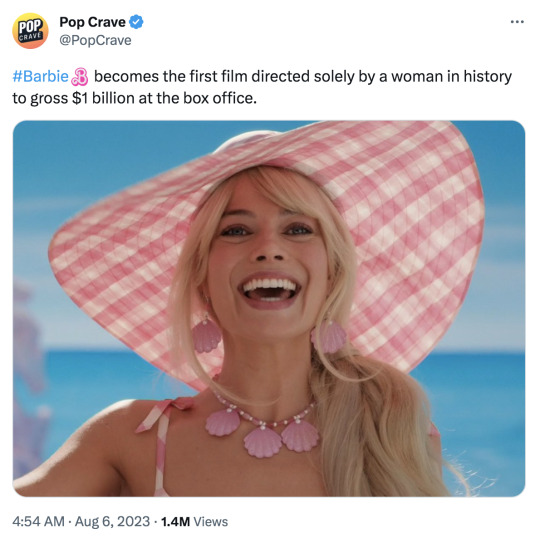
As Barbie becomes a billionaire it's heartbreaking to realize that the writers who wrote the film and the actors who participated in it are unable to fully celebrate its success because they are on strike picketing for better working conditions, increased residuals and stronger protections against AI.
4K notes
·
View notes
Text

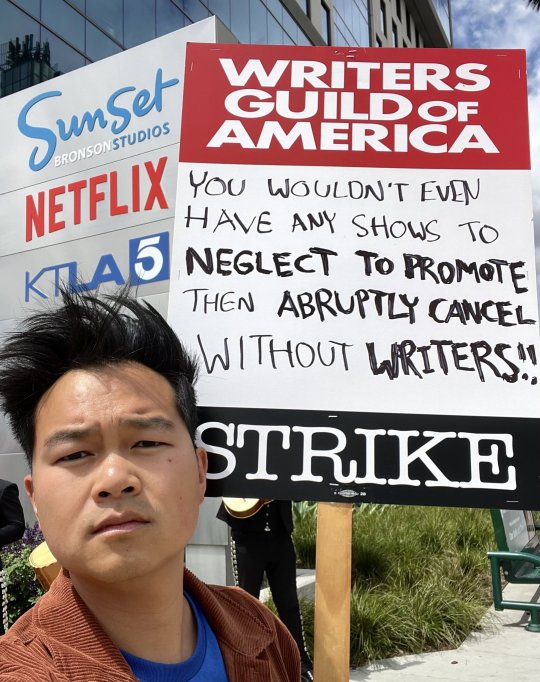
I'm honestly surprised there's never been a Netflix-specific strike. But I do think there's was a lawsuit that was settled or won, so there's that.
#Netflix#wga strike#writer's strike 2023#first kill#warrior nun#archive 81#odaat#teenage bounty hunters#santa clarita diet#the get down#the babysitters club#glow netflix
7K notes
·
View notes
Text
Hollywood Writers Strike: Official Sources
The Writer's Guild of America has voted to strike, and I want to get out ahead of something Tumblr is bad about doing and encourage y'all to PLEASE get your information about the strike from the guild itself, not from random people on Tumblr telling you it's "actually" about this or that.
The WGA wants the public to understand why they are striking. They have plenty of info available that is written with a general audience in mind.
WGA.org is the official website of the Writer's Guild of America West.
WGAwest is on Twitter and posting extensively about the negotiations and strike. This account is linked from the WGA website.
WGA also has a Linktree (linked from their Twitter bio) with more information about the strike, including their own Twitter threads about various strike issues, as well as articles in the media.
WGA Contract 2023 is a website full of information about the strike. It is one of the first links in the Linktree above. It's a great resource if you want to get deeper into the subject. There is a FAQ.
Any third party explaining the issue for you has an opportunity to, intentionally or not, insert their own spin or agenda. Get the information from the source.
#writers strike#writers' strike#writer's strike#writers strike 2023#wga#writers guild of america#hollywood writers strike
8K notes
·
View notes
Text
I love this so much
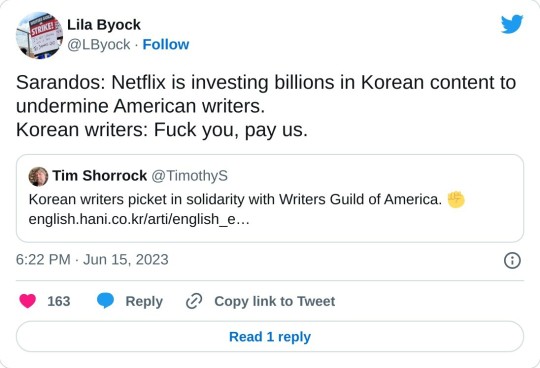

[Image IDs: the first tweet is from Lila Byock (@/Lbyock) from June 15th, 2023 and it reads:
Sarandos: Netflix is investing billions in Korean content to undermine American writers.
Korean writers: Fuck you, pay us.
That first tweet quote tweets the second image, a tweet from Tim Shorrock (@/TimothyS) from June 15th, 2023 that reads:
Korean writers picket in solidarity with Writers Guild of America. ✊
That tweet has a link to an article that I posted after it. /End ID.]
So, for those of you unaware: The Korean entertainment industry is an absolute nightmare. Actors have gone years never being paid for work they're owed pay on. The idol industry is terrible in all the ways. And it's honestly no surprise the industry is shit for writers as well. Glad to see the Korean writers are standing up for themselves too!
Edit: Not that anyone will see this because the post is too big now, but many writer organizations in countries around the world also participated in striking on June 14th, 2023.
40K notes
·
View notes